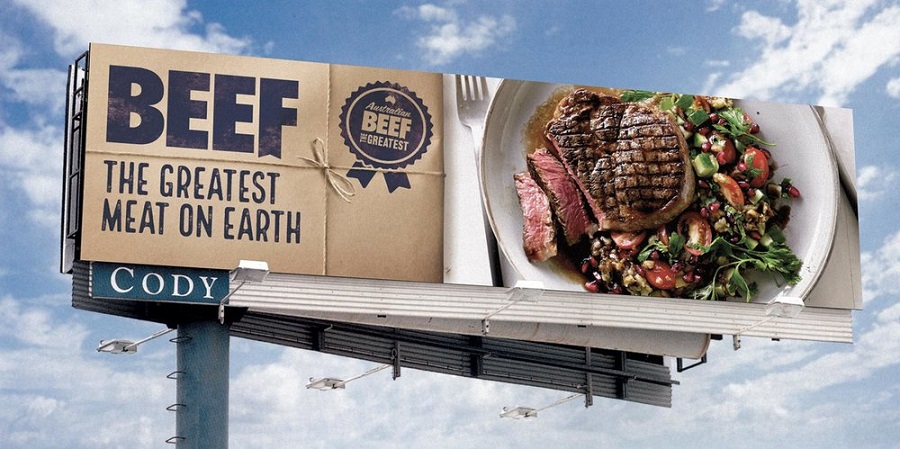Advertising that promotes animal agriculture such as meat and dairy are helping to drive an unsustainable industry that is poisoning the environment.
A new report has warned of the impact advertising has in promoting overconsumption of carbon-intensive products, with experts recommending that regulations be put in place to curb climate-harming spending habits. Until now, little spotlight has been placed on the advertising industry’s role in pushing sales of unsustainable products such as beef, high-polluting SUVs and air travel.
Published by the think tank New Weather Institute and charity We Are Possible ahead of the one-click-consumption extravaganza that is Black Friday and Cyber Monday, a new report emphasises the indirect impact advertising is having on driving the climate crisis. Researchers pointed to the industry’s promotion of materialism and work-and-spend cycles as a major reason why people are driven towards negative environmental attitudes and unsustainable spending behaviours, instead of non-work activities.
“This report argues that enough sound empirical evidence exists to support the conclusion that the advertising industry indirectly contributes to climate and ecological degradation,” wrote co-author Tim Kasser, professor of psychology at Knox College in Illinois.

Source: National Cattlemen’s Beef Association
By promoting materialism, the advertising industry is fuelling the overconsumption of cars, tobacco, beef, fossil fuels and flights – products that are high-carbon, wasteful and resource-intensive. The report highlighted beef and tobacco as the clearest “illustrative examples” of the climate-harming products that advertising businesses are pushing.
“Numerous studies make it clear that raising cattle for beef relies on unsustainable water usage, causes destruction of habitat-providing and carbon-capturing forests, and emits high levels of both greenhouse gases and chemicals such as phosphorus and nitrogen that cause excessive growth of algae in bodies of water,” said the report.

Source: Stanford Research
“Each stage in the life cycle of a cigarette, from growing the tobacco to manufacturing the cigarette to smoking the cigarette to disposing of the cigarette, is associated with a specific climate and ecological risks: deforestation, chemical pollution of water and soil, CO2 and other noxious emissions.”
To remedy the situation, the experts say that it is now crucial for regulators to rein in the industry and change its practices in order to facilitate the shift to a carbon-neutral economy, which scientists have time and again reiterated is necessary in order to avert complete climate collapse.
New Weather Institute has launched a new campaign against high-carbon advertising dubbed “Badvertising”, encouraging consumers to write to their local councillors to introduce policies in public advertising spaces such as digital advertising screens and transport infrastructure such as bus stops.

Source: New Weather Institute
It’s not the first time experts have called on more measures to be put in place against climate-harming industries and products to better inform consumers about their purchasing decisions, with a group of public health professionals in the U.K. calling on authorities earlier this year to put smoking-style graphic imagery on high-carbon products that are damaging to the climate, such as petrol pumps, plane tickets and energy bills.
Other policies that have been suggested by experts in recent months to encourage more sustainable consumption includes the introduction of a levy on high-emissions foods such as meat and dairy, following a new scientific paper warning that without drastic changes to our global food system, the climate goals outlined in the Paris agreement will remain “out of reach” – even if fossil fuels were to end immediately.
Noted U.S. environmentalist Bill McKibben, the founder of climate campaign 350.org, recently published a bruising op-ed in the New Yorker in which he lambasted P.R. companies who aid and abet industries like oil and gas, writing “if money is the oxygen on which the fire of global warming burns, then P.R. campaigns and snappy catchphrases are the kindling.”
Original source: https://www.greenqueen.com

